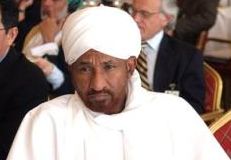Sudan former PM slams new constitution
KHARTOUM, July 10 (AFP) — Sudanese former prime minister Sadiq al-Mahdi launched a no-holds-barred attack on his country’s new power-sharing constitution Sunday, just a day after it came into force.

|
|
Sudan’s former Prime Minister Sadiq Al-Mahdi . |
Mahdi, whose government was overthrown by President Omar al-Beshir in 1989, promised to mobilise opposition parties in a broad coalition against the incoming government and lead them into elections expected to be held within four years.
“We think it is a deficient draft and deficient constitution,” Mahdi told a Khartoum news conference, referring to the new charter promulgated by Beshir Saturday in line with a January peace deal with southern rebels of the Sudan People’s Liberation Movement.
Mahdi said it was wrong that the new constitution should have been thrashed out by the ruling National Congress and the SPLM alone.
“This is a most unacceptable condition,” he complained.
He said the text addressed only the two-decade-long civil war in the south and ignored ethnic minority uprisings elsewhere in the country.
“There are many problems now in the east, in the west and in other parts of the Sudan whose resolution will require them to be represented in a comprehensive agreement and be represented in the constitution,” he said.
Mahdi criticised the power reserved for the ruling party and the SPLM under the new constitution, which allocates just 14 percent of seats in parliament to northern opposition parties and only six percent to dissident southern factions.
Mahdi said the under-representation of the opposition was one of the reasons why his Umma party had refused to join the national unity government provided for by the constitution.
It “will simply make you take responsibility without power. That is something no political force would like to engage in,” he said.
The Umma party, which broke with the main opposition alliance with the SPLM to pursue its own talks with the government, recently formed an alliance with some 10 other factions, including the Popular Congress of Islamist leader Hassan al-Turabi.
“That alliance is already preparing itself to play the role of opposition,” Mahdi said.
“All those in the north and south that are not involved in this… will find themselves together with us in this national front which will be monitoring developments in Sudan.”
The former premier said his party’s main goal in the years ahead was to secure a full restoration of democracy after the long years in which they were outlawed by Beshir’s regime.
“We are keen that the process of democratic transformation is in place and is well established” and that the elections due in 2009 “should be free and fair,” he said.
